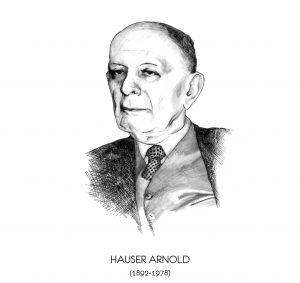 Philosopher, art critic, a well-known representative of artistic sociology, an academic member.
Philosopher, art critic, a well-known representative of artistic sociology, an academic member.
He is born in Timişoara, in the Fabric district. His father was a common Jewish tradesman. He graduates from the State Real High-school in Timişoara, then he takes an examination at the Theatre Academy in Budapest. In 1910 he enrols for the Faculty of Science in Budapest, the French-German department. For two successive years, during his University studies, he had been the correspondent from Hungary of the Temesvári Hírlap newspaper edited by Pogány Mihály.
His conception is influenced by the philosophers grouped around the Szellem magazine, mainly by Zalai Béla’s studies of philosophical methodology, and the writers Lukács György and Fülep Lajos. After he obtains his diploma, he becomes a private primary teacher, then a teacher in Budapest. In 1915 he joins the Philosophic Society run by Alexander Bernát. In 1916 he joins the „Sunday Circle” made up of Lukács György and Balázs Béla. In 1917, the members of this circle organise the series of lectures regarding the spiritual studies and Hauser Arnold approaches more spiritual topics concerning the aesthetic problems according to Kant. În 1918 he announces his lectures under the following title – The Artistic Dilettantism. In 1918 he maintains his PhD work at the Faculty of Science in Budapest dealing with the Systematic problem of aesthetics.
Before and during the First World War, he participates in the activities of the Philosophic Society and „Sunday Circle” in Budapest. During the period of the Councils’ Republic he deals with the reformation of the artistic education. This is the reason why he must leave Hungary. In 1921 he continues his studies in Berlin, then in Vienna. He listens to A. Goldschmidt’s lectures of art criticism, then to the sociologic ones of E. Troeltsch. At the beginning, he is influenced by Wölflin’s categories of style history – being aware of their restrictions – he strives to approach an independent and contemporary methodology of art’s sociology. In Hauser’s viewpoint, art creation is determined by psychological, stylistic and sociological factors; he considers the sociologic element very important.
In 1924 he moves to Vienna and accepts a job at a film society. His worries concerning his own subsistence make his scientific ambitions and work power decrease. In 1938, after the Anschluss he emigrates to England, where he focuses on his main research referring to the art sociology. He is entrusted with the writing of a volume of art sociology. This book, published only in 1951, is acknowledged internationally and, as it represents fundamental work of art sociology, is translated into more languages. Between 1951 and 1957 Hauser Arnold teaches art history at the Faculty in Leeds. Between 1957 and 1959, then between 1966 and 1967 he is a guest professor in America. His Art Sociology is also published in the Hungarian.
In 1969 the Hungarian Radio broadcasts a conversation between Hauser Arnold and Lukács György, in 1976 the Hungarian Television prepares a feature film about his life and personality. In the summer 1977 he settles to Hungary but the transformation of his valuable scientific projects into reality is stopped by his illness.
Important creations: The Social History of Art (1951; in German, the original version: Sozialgeschichte der Kunst und Literatur, 1953; in Hungarian: A művészet és az irodalom társadalomtörténete, I-II. 1968-69); Philosophie der Kunstgeschchte (1958, with its new title Methoden moderner Kunstbetrachtung, 1970); Der Manierismus. Die Krise der Renaissance und der Ursprung der moderner Kunst (1964; with its new title Der Ursprung der moderner Kunst und Literatur. Die Entwicklung des Manierismus seit der Krise der Renaissance, 1973); Soziologie der Kunst (1974); A művészettörténet filozófiája (1978).
In 1969 the Hungarian Radio mediates a retrospective conversation between Arnold Hauser and György Lukács. In 1967 the Hungarian Television makes reportage about his life and personality.
In the summer of 1977 he settles down in Hungary. He is buried in Budapest.
